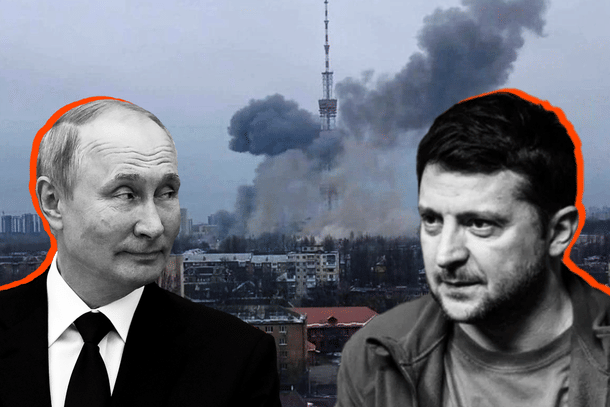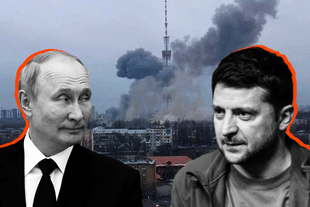World
Ukraine's Future Depends On Buying Peace With Russia, Like Finland During Cold War
R Jagannathan
Mar 21, 2025, 11:32 AM | Updated Mar 25, 2025, 03:24 PM IST
Save & read from anywhere!
Bookmark stories for easy access on any device or the Swarajya app.


There is little doubt that both Ukraine and Russia have paid a heavy price in their ongoing war, which may be tapering down, at least temporarily, due to the efforts of Donald Trump.
This pause should force Ukraine to reflect on where its best interests lie: in prolonging the dispute with Russia or learning to live with the loss of territory and military defeat.
Estimates of casualties vary depending on who is making them, but the chances are close to one million Ukrainians and Russians may have died either while fighting the war on the front or through collateral damage. Just under seven million Ukrainian refugees have registered worldwide for support and relocation due to the war.
As for other losses, including hard and soft infrastructure, property, and assets, a UN group has assessed the damage so far at $176 billion, and post-war reconstruction may cost upwards of $524 billion.
Clearly, Ukrainian President Volodymyr Zelenskyy should be looking for ways to end the war, not prolonging it. Sometimes, acceptance of defeat is the first step towards renewal and ultimate victory, but he is still pumping up European nations for more war munitions and aid, even while trying to do a deal with Donald Trump’s America for minerals in return for security guarantees.
It is not clear whether the "deal", if it happens, is to pay for past American military support or future guarantees without America’s direct military involvement. But Zelenskyy would be wise to assume that the best Trump can do is to ensure that the Russian attacks stop. And if he really wants to protect his people from further losses, he should also be seeking guarantees from Vladimir Putin, not just Europe and Trump.
Most countries that emerged successful after a brutal war — Germany or Japan, for example — started with the acceptance that they had been defeated, and that they had to curtail war efforts in order to reorient resources towards renewal and rebuilding.
Germany and Japan had no other option, for the terms of the post-war deal with America — which included security guarantees — forced them to focus on economic development, not war-making capacities. This shift of resources from war to peace made both Germany and Japan the top economic performers for the next half-century and more.
This is exactly what Zelenskyy should attempt.
First, accept that the war must be ended and that most resources must go towards rebuilding a destroyed country.
Second, the security guarantee cannot come from America or Europe, but a joint America-Europe-Russia understanding to ensure Ukraine’s neutrality and willingness to disarm substantially. It goes without saying that Ukraine will not join NATO or any anti-Russian defence establishment created by a post-Nato Europe.
Third, Ukraine must seek to rebuild itself with both Western and Russian help. It cannot, and should not, try to lean too much towards Europe and against Russia.
Fourth, it must accept — tacitly, if not explicitly — that Russia is not going to vacate the territories it acquired in war or otherwise (basically Crimea and the Donbas region, which has a high Russian population).
During the cold war and even later, western media had a term for such a neutral power that accepts Russian security red lines as a given: Finlandisation.
As a country vulnerable to Russian intimidation and pressure, Finland took extreme care not to offend Russia, even while trading with both Europe and Russia. In return, Russia did not try to overawe Finland or threaten it with nukes, as it has done with Ukraine.
Ukraine’s future depends not only on Europe but also Russia, with whom it has had cultural and religious ties — ties broken by its dalliance with NATO and the European Union. And contrary to assumptions, their economies were also more integrated than the world assumed. For example, the submarines India obtains from Russia use Ukraine-built turbines.
If Zelenskyy chooses to retain his animosity towards Russia and continues to seek a security alliance with European powers, it implies that the war, even if it tapers down now, will resume once he feels stronger on the ground. Russia is not going to accept that, and if the US is not going to back Zelenskyy either, one cannot rule out another brutal war restarting sometime in the foreseeable future.
Ukraine’s best hope is to create a new country with high growth potential, just as Konrad Adenauer did in Germany after the Second World War. Or just as South Korea did after the Korean War. Today, while North Korea remains a nuclear threat, no one in his right mind would want to go there and not South Korea.
Prolonging the war with Russia is not in Ukraine’s best interests. It should focus on making western Ukraine the granary, resources, and talent hub of Eurasia. Ukraine can win by focusing on economics and rebuilding, this time without having the expensive need to build a war machine to take on Russia.
Jagannathan is former Editorial Director, Swarajya. He tweets at @TheJaggi.




